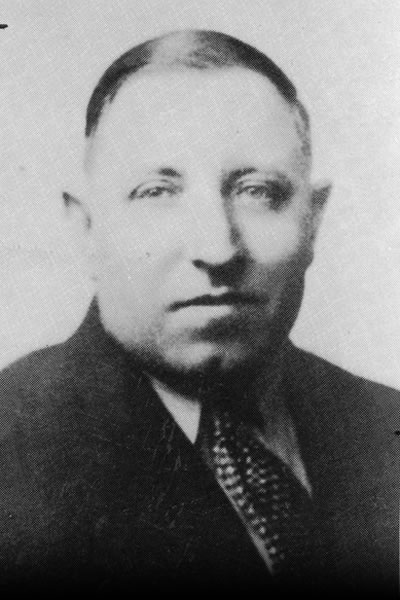

Queer Places:
1710 North Crilly Court, Chicago, IL 60614, USA
Soldiers Home Cemetery, Washington, Distretto di Columbia 20011, Stati Uniti
Gerber Hart Library, 6500 N Clark St, Chicago, IL 60626, Stati Uniti
 Henry Gerber (June 29, 1892 in Passau, Bavaria[1]–
December 31, 1972)[2]
was an early homosexual rights activist in the United States. Inspired by the
work of Germany's
Magnus Hirschfeld and his Scientific-Humanitarian Committee, Gerber
founded the Society for Human Rights (SHR) in 1924, the nation's first known
homosexual organization, and Friendship and Freedom, the first known
American homosexual publication. SHR was short-lived, as police arrested
several of its members shortly after it incorporated. Although embittered by
his experiences, Gerber maintained contacts within the fledgling homophile
movement of the 1950s and continued to agitate for the rights of homosexuals.
Gerber has been repeatedly recognized for his contributions to the LGBT
movement.
Henry Gerber (June 29, 1892 in Passau, Bavaria[1]–
December 31, 1972)[2]
was an early homosexual rights activist in the United States. Inspired by the
work of Germany's
Magnus Hirschfeld and his Scientific-Humanitarian Committee, Gerber
founded the Society for Human Rights (SHR) in 1924, the nation's first known
homosexual organization, and Friendship and Freedom, the first known
American homosexual publication. SHR was short-lived, as police arrested
several of its members shortly after it incorporated. Although embittered by
his experiences, Gerber maintained contacts within the fledgling homophile
movement of the 1950s and continued to agitate for the rights of homosexuals.
Gerber has been repeatedly recognized for his contributions to the LGBT
movement.
Gerber was born Henry Joseph Dittmar (some sources say "Josef")[3] on June 29, 1892, in Bavaria.[2] He changed his name to "Henry Gerber" upon emigrating to the United States in 1913.[3] He and others in his family settled in Chicago because of its large German immigrant population.[2] In 1917, Gerber was briefly committed to a mental institution because of his homosexuality. When the United States declared war on Germany, Gerber was given a choice: be interned as an enemy alien or enlist in the Army. Gerber chose the Army and he was assigned to work as a printer and proofreader with the Allied Army of Occupation in Coblenz. He served for around three years.[4] During his time in Germany, Gerber learned about Magnus Hirschfeld and the work he and his Scientific-Humanitarian Committee were doing to reform anti-homosexual German law (especially Paragraph 175, which criminalized sex between men).[5] Gerber traveled to Berlin, which supported a thriving gay subculture,[6] on several occasions and subscribed to at least one homophile magazine.[4] He absorbed Hirschfeld's ideas, including the notion that homosexual men were naturally effeminate.[note 1] Following his military service, Gerber returned to the United States and went to work for the post office in Chicago.[4]
1710 North Crilly Court, Chicago
Gerber's activities between the demise of SHR and 1927 are undocumented. In 1927, Gerber travelled to New York City, where a friend from his Army days introduced him to a colonel. The officer encouraged Gerber to re-enlist and he did. Gerber was posted to Fort Jay on Governors Island and his post-war talents as a proofreader and editor likely put to use by the Army Recruiting Bureau in the production of their magazines and recruiting publications. It was likely that such low profile office work allowed him to continue in the Army, with occasional harassment until 1945, when he received an honorable discharge.
During his second enlistment, Gerber ran a pen pal service called "Connections" beginning in 1930. The service typically had between 150 and 200 members, the majority of whom were heterosexual. He continued writing articles for a variety of magazines, including one called Chanticleer, in which he sometimes made the case for homosexual rights.[12] It was the norm for gay writers to use pseudonyms when writing on gay matters; Gerber sometimes wrote under his own name but sometimes used the name "Parisex". Gerber continued to write for the next 30 years.[8] In the 1950s, Gerber began exploring the New York gay scene more extensively and maintained a voluminous correspondence with other gay men, discussing gay organizing and strategies for answering societal prejudice.[14] Gerber lived in New York until near the end of his life, when he moved into the Soldiers' and Airmens' home in Washington, D. C..[2] There he worked on his memoirs (the manuscripts are thought to be lost) and translations of German novels.[14] Gerber was 80 years old when he died at the home on December 31, 1972.[2] He was buried in the adjoining United States Soldiers' and Airmen's Home National Cemetery .
My published books: